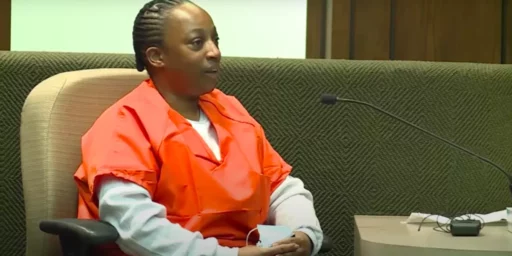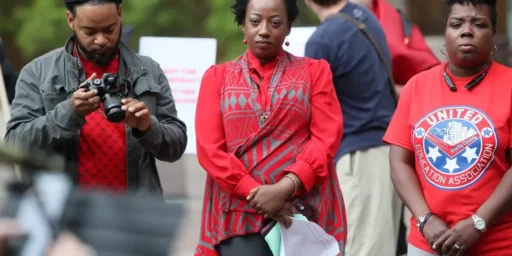An Update On Pamela Moses, Plea Bargains, & The Trial Tax
A new trial that might not have happened with a plea
![Pamela Moses [Center] attending a May Day Gathering, May 1st 2019. Credit: Joe Rondone/The Commerical Appeal](https://otb.cachefly.net/wp-content/uploads/2022/03/07568ac6-1484-4ff4-963e-d3698906cf7c-MCA1Brd_02-09-2022_Appeal_1_A001__2022_02_08_IMG_Pam_Moses_1_1_RKVGBNN4_L1776917757_IMG_Pam_Moses_1_1_RKVGBNN4-edited.webp)
Last month, I wrote about Pamela Moses, a woman sentenced to six years in prison for attempting to reregister to vote while still on probation. At the time, I used it as an example of what’s called “The Trial Tax”–the harsh sentences that people often get when they refuse a plea deal and choose to exercise their Constitutional right to a trial. There have been some new developments in the case since then. A few days after my article was published, Pamela Moses’ motion for a new trial was granted. Here are details from the Memphis Commerical Appeal’s article:
A motion has been granted for a new trial for Pamela Moses, the Memphis woman sentenced to six years in prison earlier this month after being convicted a year ago on charges of illegally registering to vote. […]
The case hinges on what happened in 2019, when she tried to restore her voting rights, and asked a probation officer to complete the certificate that starts the process in Tennessee. The officer certified that Moses had completed probation for the crimes impacting her voting rights, so Moses submitted the certificate and registered to vote. […]
The officer was wrong. Whether Moses was aware of the mistake became the crux of the legal case that led to her six-year sentence, an outcome she is seeking to overturn. […]
During the initial trial, the judge who sentenced Moses accused her of deceiving officials, but Moses argued that she believed her voting rights had been restored when she looked into voting in 2019.
The Guardian [Newspaper in it’s coverage of the trial and verdict] published an email from Joe Williams, an administrator in the Tennessee Department of Correction, to Lisa Helton, a top department official. In the email, Williams stated that the officer who had filled out and signed a certificate confirming her probation had ended had “failed to adequately investigate the status of this case.”
“He failed to review all of the official documents available through the Shelby County Justice portal and negligently relied on a contact note from a court specialist in 2016,” the email obtained by The Guardian read. “Had Manager Billington thoroughly investigated he would have found that an additional probation order dated March 4th, 2019 was executed following that revocation spelling out the new terms of the probation as well as an order filed June 13th, 2019 advising Pamela Moses that she remained on supervision until August 13, 2020.”
It is based on this document, which was not presented in the initial trial, that a motion for a new trial was granted.
https://www.commercialappeal.com/story/news/local/2022/02/25/pamela-moses-sentenced-illegally-registering-to-vote-new-trial-memphis/6943691001/
At this time it appears that Shelby County District Attorney Amy Weirich still plans to pursue the second trial. As noted in my original article, prior to going to Trial, Moses had been offered a plea bargain in which she would plead guilty to a misdemeanor and received no jail time. It was that disparity between no jail time and six years that represented the trial tax.
Beyond updating readers on Moses’ status (a topic that has come up in comment threads) these developments provide an opportunity to address another aspect of the plea bargaining process: the waiving of rights.
When one accepts a plea bargain, they typically waive most of their rights to appeal their sentence. While some narrow Federal grounds are preserved, that process is difficult and, due to backlogs, can take years. If Moses had taken the plea then it would have been unlikely that she would have been able to overturn that conviction despite this new evidence due to waiving the right to appeal.
While that might not seem like a big issue in this case since she wouldn’t have had additional jail time, it’s most likely that accepting the conviction would have lengthened her time on probation (and while on probation, her actions and movement (among other things) are regulated and reviewed by the State). If it her agreement had included some incarceration, that waiver would have meant she’d still be under lock and key.
As I mentioned in the previous post, the reality is our current criminal legal system could not operate without the widespread use of plea bargaining. That’s in part the reason for the trial tax. That the tax exists, and that plea bargains involve waiving one’s right to appeal, demonstrate that ultimately this is about operational efficiency and not justice.






And as you and I have discussed in the past, the trial tax, like poll taxes, is deliberately (IMO) structured to impact the poor and disenfranchised. Like poll taxes, its impact is deliberately structured to support keeping the peasants in their place. No surprise that Ms. Weirich is going to be re-prosecute this case.
I am flummoxed by this.
Why do we restrict voting rights of felons at all, or ever? It is bonkers in my head. Rights should not be curtailed because you are in prison. I get the limiting of movement part, incarceration, but shouldn’t all stated and implied rights apply?
Besides slavery, the biggest problem with our constitution is there is no defined right to vote. It was a big oversight.
Moses was doing her business. Trying to be a good citizen. Registering to vote. Registering to vote should never be a crime.
Six years and a day? Fuck you! If you prosecuted this case I fucking hope you burn in hell for eternity. You are a truly shitty person.
I just don’t understand it. It makes zero sense.
@de stijl:
Except that I’m not sure it isn’t a feature rather than a bug. This issue was left to the states specifically to permit various sorts of abuses that would not have looked good done at the national level. This was the first government of [some] of the people since ancient times. Various stakeholders at the convention needed to compromise on many issues to get buy in. Undoubtedly, making sure that only “the right” people (maybe “our kind?”) got to vote was probably an important one.
At WAPO Radley Balko has a list of eight more serious, and non-partisan questions for Supreme Court Nominees. This seems relevant here.
J. K. Galbraith had a rule that systems evolve to serve the interests of those who control the system. Our legal system seems to have decided that the convenience of the legal system overrides the Sixth Amendment.
@de stijl:
It makes perfect sense if you’re a Republican (she is) pretending vote fraud is actually a thing. And needing to pander to the base that you’ve convinced it’s not only real but an existential threat. Of course if Ms. Moses had had the good sense to be white…
I like that this case became known.
It brought to the forefront egregious affronts to just common decency. This should never have been prosecuted. Pursuing it was a super dick move.
Six years and a fucking day? Are you serious? What is your major malfunction? Were no adults in charge?
I am disgusted this happened. I am glad this happened.
It brought a very harsh spotlight down on this stupidity, the madness.
I understand that I might be an outlier on voting rights for the currently incarcerated, but administratively rescinded voting rights for ex-cons after release is cruel and stupid. They did their time. Were duly processed out.
Assigning basically all rights back to someone after release except for the right to vote for their preferred candidate is just flat-out wrong. Blatant administrative disenfranchisement. Straight up. Fucking bullshit.
It disgusts me.
@de stijl: I’ll be glad it came to light when an appellate court makes a decision that will nullify the trial tax imposed in this case. Up until then, my jury is still out (pun intended and not very funny).
Nice post Matt. This case is a good example that highlights many problems with our criminal justice system. Unfortunately, there does not seem to be much appetite for systemic reform.
Regardless, even in the least charitable interpretation to Ms. Moses and assuming Ms. Moses deliberately intended to break this law, 6 years is way too long of a sentence for a victimless process crime.
@Just nutha ignint cracker:
The just resolution would be to sentence the prosecutor and the judge to six years and a day. Rescind their rights.
@Andy:
First, as always, thank you (and everyone else) for the response(s).
This is something I want to address, but to do it requires a separate post, so look for that later this weekend (fingers crossed).
The defense of plea bargaining usually involves the (correct) observation that were it not for pleas, the entire system would grind to a halt resulting in more injustice.
But this assumes that the taxpayers are unable to adequately fund the judicial system to provide enough attorneys, courtrooms, and judges to handle the volume of people who get arrested.
This would of course, be insanely expensive.
But that’s the point.
Taxpayers regularly cough up enough tax revenue to hire enough police officers, build enough jails, and build and staff enough prisons to handle the flow, and they do it eagerly (which is why every politico demands more, always more funding for cops and prisons- because its popular).
Pleas are just a safety valve allowing us to erect a massive carceral system of injustice and do it on the cheap.
We could of course scale back the drug war and fund more mental health systems to handle the homeless and deranged who make up a large portion of our court systems.
But that’s never popular.
Late to this thread, but I appreciate this issue being raised. 30+ years experience in the federal criminal defense world, and I can say with assurance that the trial tax is a thing. A big thing. Had to explain it hundreds of times to indigent clients. Operation of the federal sentencing guidelines contributes greatly to the trial tax, plus the incredible amount of discretion given to federal prosecutors in what criminal charges are charged.
So pleased that a former federal PD and member of the sentencing commission will be elevated to SCOTUS.
@Chip Daniels:
That the system is sometimes used to railroad the innocent is highly problematic. But the overwhelming percentage of those charged with crimes are in fact guilty of said crime. The plea bargain saves them the time, stress, and burdens of the trial in exchange for a lesser sentence. For prosecutors, it does the same while ensuring that the person serves the sentence—and avoids endless appeals.
@James Joyner:
For the actually innocent, the wrongly accused, the system sucks. You have to plead out to avoid the trial tax for something you did not do.
I give yearly to the Innocence Project. Money well spent. A higher percent of folks in prison than you expect are actually innocent of the charges against them.
@de stijl: The Innocence Project itself estimates it’s 1 percent of the prison population. That’s a lot of people (IP says ~20,000) considering how many we incarcerate. But the point remains: essentially everyone in prison is actually a criminal.
@James Joyner:
Check that dataset more carefully! Be an informed, aware consumer of click-bait bullshit.
“extrapolating off the 281 known examples …”
is a huge tip-off. Tiny dataset. Purposefully winnowed. It’s garbage data.
“Extrapolating off” huge, huge red flag. Whoah! That is rank ignorance of statistics. No pro would ever say that. You would be laughed at.
We have no idea of the actual number of true innocents in jail / prison. Absent omniscience, we cannot know.
What you cited is risible, shameless garbage click-bait. You got rolled.
Even if we accept your 1% assertion as true, shouldn’t the state that there are currently at least 20,000 innocent folks imprisoned alarm you and want to rake action?
The US has the highest number of folks in prison and jail. We have the highest percent of people incarcerated. We beat second place China on both fronts. By a lot.
It isn’t even close at all. We are the extreme outlier on total pop and percent. By a lot.
Maybe we should craft a system that more closely approximates the rest of the developed world instead of deciding that going out of the way to prosecute and sentence a woman to 6 years and a day for attempting to register to vote?
Maybe that’s a huge fucking waste of resources? Money and time and resources better spent elsewhere?
Maybe we should not have for-profit prisons?
(Dataset of 1 in re Pamela Moses – I know, I was hyperbolically making a point.)
@James Joyner:
The most important thing about pleas is that they prevent our understanding of guilt or innocence.
People guilty of heinous felonies plead to misdemeanors, and factually innocent people plead guilty to misdemeanors, all just to save time and trouble.
The fact is we have no way of knowing how examples of each there are.
The facts of the case are never brought to light and examined or corroborated.
So it’s possible that a very large percentage of people are factually innocent, or at least innocent of the crime to which they pled or vastly more guilty and escaped true justice.
We just don’t know.